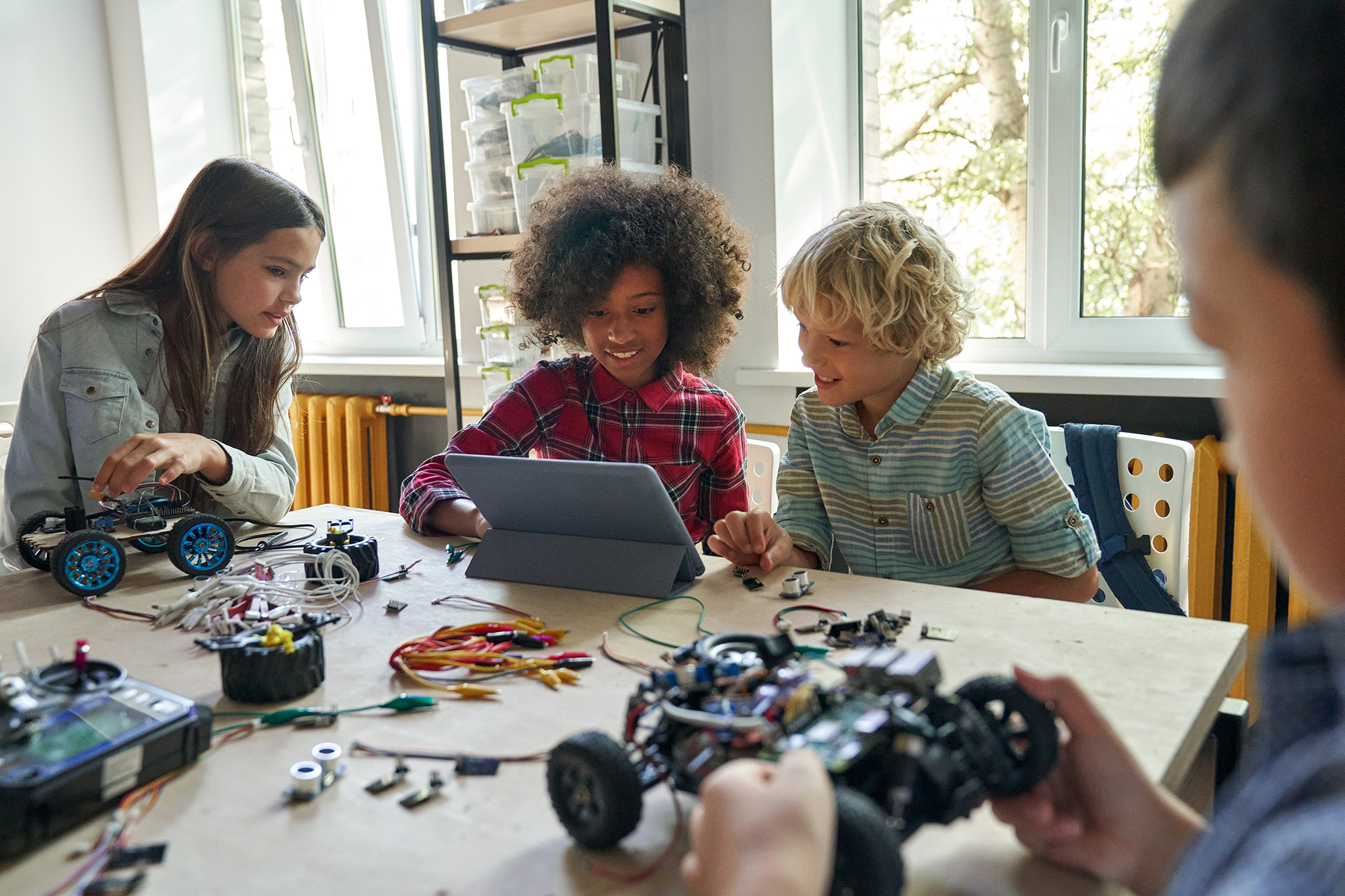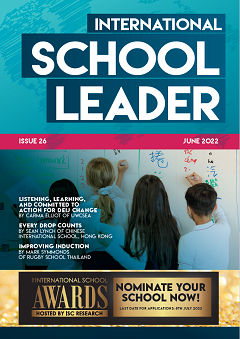by Judith King-Calnek
The United Nations International School (UNIS) is perhaps the most diverse school in the world. Its parent organisation is universally hailed as the standard of multiformity. UNIS prides itself in academic excellence and a student body that represents 110 countries with 96 mother tongues spoken, and a faculty from 69 countries. As the fundamental principles of diversity, equity, and inclusion (DEI) have been at the heart of UNIS’s mission and history since the school’s inception in 1947, it may seem curious that such an institution’s office of DEI was created last year.
How we began
Like most schools, the UNIS community was deeply shaken by the events of 2020 as the COVID-19 pandemic revealed racial and socioeconomic inequities, which were further laid bare by the George Floyd killing and subsequent social unrest. These events spurred alumni to reflect on their past racialised experiences in the classrooms. Current students were given a voice and language to articulate their thoughts and feelings. A newly framed discourse on the global and historical legacies of race and racism resonated with parents (especially, but not solely) of Black students, who coalesced to express their concerns. Staff members (re)examined the uneven demographic composition of the faculty body and realised that some groups, especially those of African descent, were sorely under-represented. These voices reminded school leaders that one of the duties of international schools is to help its community make sense of the world for students to realise their full potential as global citizens. UNIS leadership listened attentively and acknowledged there was a need for improvement to ensure that all people felt included and welcomed throughout their school experience.
This scenario was not unique to UNIS. Many school boards and leadership teams throughout the world found themselves grappling with how to respond to social media posts and emails that retold disturbing past encounters and even racial trauma. Some school leaders reached out to listen further, others sought to quell the noise, others waited in silence. For some, the question was, ‘Should we respond?’; however, for most the question was, ‘How should we respond?’. It has become increasingly clear that this is not simply an American phenomenon or a potent localised issue, but another type of pandemic that is systemic and needs to be addressed with intention – and international schools are equally as affected as their national and local counterparts. Hence the meteoric growth of DEI in schools and across all industries.
Our approach to DEI
DEI is not new. Many schools have had active DEI offices and programmes for decades and have reported great successes, as well as setbacks. Some school leaders may think that having diverse student and faculty bodies is enough to sustain an ethos of equity and inclusivity. But a school community is about relationships, and like any other relationship, it has to be constantly tended with explicit intention and genuine commitment.
UNIS is taking a multi-pronged approach to address DEI. The first step was creating a DEI team composed of various constituents to focus on the school culture, curriculum and overall composition of our community:
- Culture: our aim is to ensure a culture where everyone feels a sense of belonging. We are working closely with our parent association’s DEI committee, alumni, students, faculty and staff. Activities include anti-bias/anti-racism (AB/AR) workshops, webinars featuring DEI specialists and members of our community, reading groups and a student mentorship programme, among other activities. Some activities are tied to specific calendar events; others are not.
- Curriculum: research reminds us that students need to have ‘windows and mirrors’: windows to look through and see the world, and mirrors to see themselves reflected in order to feel validated. We have engaged curriculum experts to work with teachers to explore ways to diversify the curriculum, review assessment and pedagogical practices to support the needs and experiences of our diverse learners and better represent global demographics. Most work has been focused on the social sciences, languages and literature. We will continue in those areas, then expand to other subjects.
- Composition: we are working with our human resources department and admissions office to improve our recruitment, hiring and admissions, and retention of Black, Indigenous and People of Colour (BIPOC) faculty and students.
What we’ve learned
It’s been a full year since UNIS created the position of director of DEI. We embarked on this journey and began creating structures and systems to reinforce our work. We’ve had a number of successes and some challenges, which we continue to work through. Key learnings include:
- Know your school. Identify which part of DEI your institution needs. What diversity means at different schools varies (racial and ethnic, religious, socioeconomic, gender, etc). As for inclusion, international schools struggle with the paradox of what it means to be inclusive when our schools are exclusive, by definition. Each school will have its unique challenges, which will determine the shape and focus of DEI initiatives. UNIS’s international and linguistic diversity are beyond compare; however, we have acknowledged that some groups, specifically BIPOC faculty and students, are under-represented. While we do not experience academic inequities based on race and ethnicity, we have been working hard to ensure that all groups feel included and welcomed. A skilled DEI team will help your community negotiate its way through the global and local issues. DEI is important to international schools, but the issues and identities will vary depending on the locale. One size does not fit all.
- Make DEI part of strategic planning. The call for DEI illuminated the pervasive nature of systemic inequities. There is a tendency to treat DEI topically, with workshops and training, which are important, but for real change to occur, DEI must become part of a school’s strategic plan. With the unmitigated support of our board of trustees, UNIS has been diligent about explicitly building DEI into key performance indicators of the strategic plan. Our team is hard at work on establishing metrics to document and monitor them.
- Create safe spaces. DEI requires that we all listen carefully to each other. It’s necessary to allow everyone to be heard, and in different forums, ranging from large and diverse groups to small affinity groups. Community members need to have dialogue through which they strive for understanding and appreciation of different perspectives, rather than try to reach a conclusion. Leadership must be onboard, sometimes working with others, at other times apart to focus on issues that pertain specifically to leadership. For example, leadership will need to consider how implicit bias impinges on the recruitment, hiring and retention processes, whereas teachers need to focus on how it manifests itself in classrooms. At UNIS we’ve found ‘courageous conversations’ to be rewarding, although not always easy initially.
- Make way for students. Our students have been at the forefront of many of our DEI efforts. Working with faculty advisers who guide rather than direct them, students have spearheaded a number of events and activities. In the process they are gaining skills in leadership, curriculum development and pedagogy. They have challenged our community to rethink many of our notions of identity and they are taking an active role in shaping their world. Some of their accomplishments have included holding voter education and registration drives, workshops, podcasts and interviews on identity, intersectionality and microaggressions. As masters of social media, through their DEI work, UNIS students have become critical creators of social media rather than passive consumers.
- Involve the entire community. All community members (students, parents, faculty, staff, leadership and alumni) should engage in DEI activity. That will mean different things for different people, although all should include AB/AR training. UNIS has provided a workshops for the entire faculty, staff and administrative teams. Other events have been collaborations with parents, students and alumni, which have been very well received and led to deeper connections.
- Remember, DEI is ongoing. Just as curricular work is ongoing in a school, so is DEI. We live in an imperfect world that is full of inequities and discrimination, which creep into our schools. School leaders must realise that this is not a quick fix, but rather a reframing of the ways in which we must think about our schools and ourselves.
 Judith King-Calnek, PhD is Director of DEI at United Nations International School, New York. Connect with Judith directly on LinkedIn
Judith King-Calnek, PhD is Director of DEI at United Nations International School, New York. Connect with Judith directly on LinkedIn
Subscribe to ISL Magazine for more!


